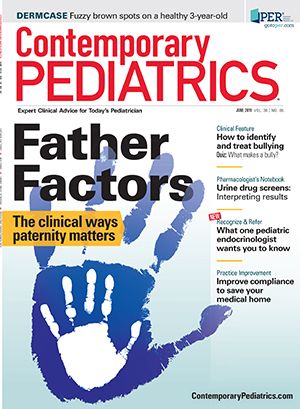Fathers’ epigenome affects reproductive health
New research suggests fathers need to live healthy lives well before conceiving children.
Adelheid Soubry, MSC, PhD

When it comes to the health of their unborn children, fathers’ environmental and lifestyle-related exposures matter.1
Potential epigenetic links between fathers and their offspring can be far reaching. One study, published in July 2016 in Breast Cancer Research, suggests paternal nutrition could affect a father’s future daughter’s risk of developing breast cancer. The researchers in this case used an animal-based, high-fat diet in rodents, which showed increased breast cancer risk in daughters after administration of the carcinogen 7,12-dimethylbenz[a]anthracene (DMBA).2
This study on a father’s influence on his daughter’s breast cancer risk contributes to a new area of research on environmentally induced risk for chronic diseases in offspring through the father, researchers write in another paper published in October 2016 in Breast Cancer Research.1
“[F]ew epidemiological designs explore potential influences from the paternal environment of offspring health. This is surprising given that numerous animal models have provided evidence that the paternal environment plays a role in the nongenetic inheritance of preconceptional exposures through the male germ line,” according to Adelheid Soubry, MSC, PhD, an epigenetic epidemiologist and associate professor at KU Leuven University, Belgium. Soubry authored the paper “POHaD: Why we should study future fathers,” published in April 2018 in Environmental Epigenetics.3
Why study fathers?
Recent finding in humans suggest that the epigenome of sperm cells can indeed be affected by paternal exposures, says Soubry, who has been busy at epigenetic meetings advocating for the Paternal Origins of Health and Disease (POHaD) paradigm, to complement the more maternally focused Developmental Origins of Health and Disease (DOHaD) research field.
“For obvious reasons, future mothers have been targeted in terms of their lifestyle during pregnancy. A future mother needs to take care of her health, which will benefit her child. This is indeed important, and prevention and policies in this regard are necessary,” Soubry says.
During the last decade, researchers have been studying and have published on the potential effects on sperm epigenome and offspring of paternal obesity, lifestyle, nutrition, and more. For example, Soubry and colleagues have studied and shown epigenetic effects in offspring from paternal obesity4 and exposure to organophosphates in humans.5
“In a cross-sectional study in healthy volunteers living in North Carolina, we found an association between aberrant traces of environmental pollution (organophosphates, from exposures to flame-retardants) in the same individuals, suggesting transmission of harmful effects from a father’s environment to his child,” she says.
Prepregnancy health includes both parents
In essence, both parents’ lifestyles, environments, and health are important even before pregnancy for the health of the future child.
“The ‘preconceptional window’ and lifestyle during this period can change the epigenome in male and female germ cells, which can serve as a messenger from the environment toward the child,” Soubry says. “This can have both positive and negative consequences. Hence, ‘adaptation’ and ‘risk for diseases’ are 2 concepts that have come [to light].”
The terms “preconceptional window” and “exposure” need to be interpreted broadly, according to Soubry.
“Because of differences in the biology in male versus female germ cell development, we believe that windows of susceptibility are different by sex. An epigenetic change facilitated by the environment may differ if it was the developing oocyte or the sperm cell that was exposed earlier in life,” Soubry says.
It’s surprising, according to Soubry, that whereas women are encouraged to improve their lifestyle habits, no specific recommendations are applied for male partners. Animal and human studies suggest providers and others should encourage men to live healthy lives before having children, she says.
“More research, and more papers on this topic, will help us understand the mechanisms behind this, and help clinicians and the general public to implement these findings, so men and their partners are aware of the potential consequences of unhealthy lifestyle choices,” Soubry says.
References:
1. Romanus S, Neven P, Soubr y A. Extending the Developmental Origins of Health and Disease theory: does paternal diet contribute to breast cancer risk in daughters? Breast Cancer Res. 2016;18(1):103.
2. Fontelles CC, Guido LN, Rosim MP, et al. Paternal programming of breast cancer risk in daughters in a rat model: opposing effects of animal- and plant-based high-fat diets. Breast Cancer Res. 2016;18(1):71.
3. Soubry A. POHaD: why we should study future fathers. Environ Epigenet. 2018;4(2):dvy007.
4. Soubry A, Schildkraut JM, Murtha A, et al. Paternal obesity is associated with IGF2 hypomethylation in newborns: results from a Newborn Epigenetics Study (NEST) cohort. BMC Med. 2013;11:29.
5. Soubry A, Hoyo C, Butt CM, et al. Human exposure to flame-retardants is associated with aberrant DNA methylation at imprinted genes in sperm. Environ Epigenet. 2017;3(1):dvx003.
